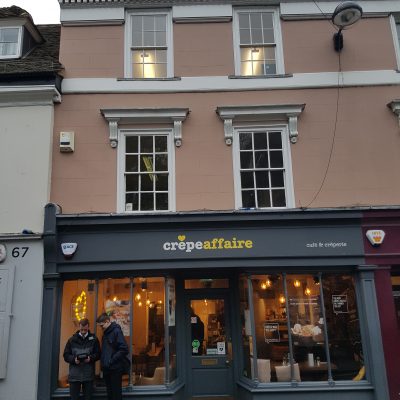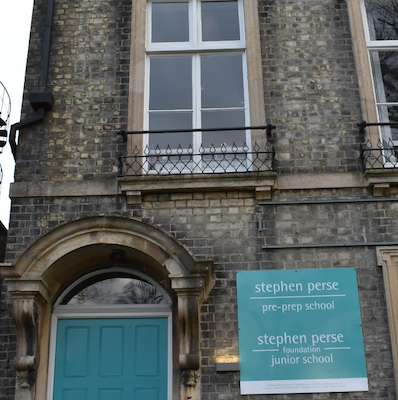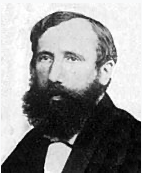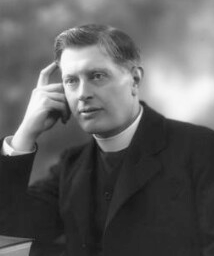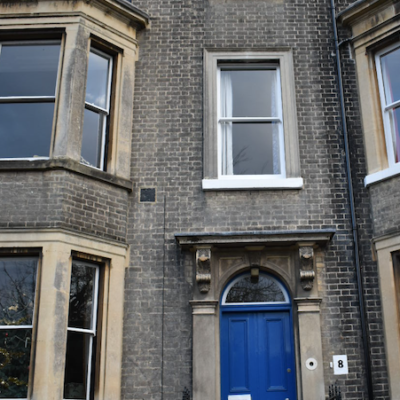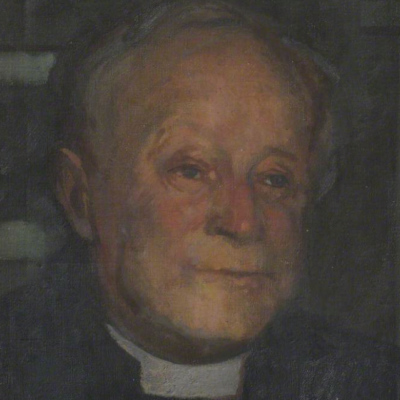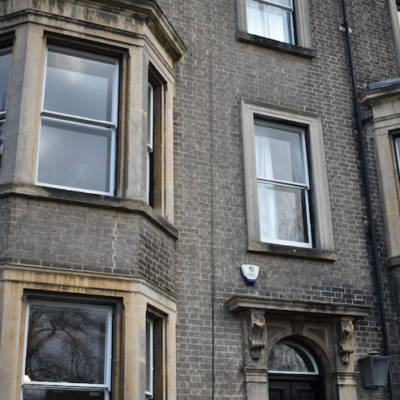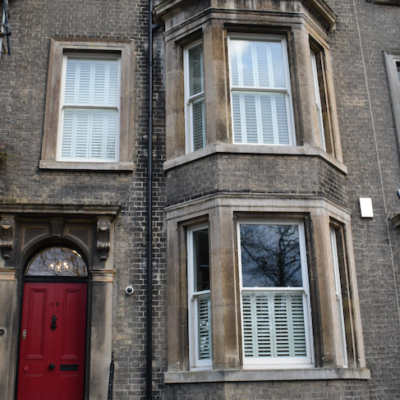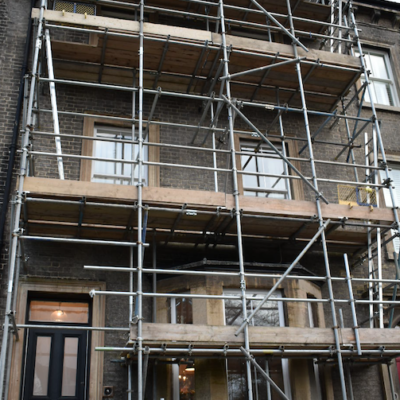Search by topic
- archaeology
- architecture
- bricklayer
- Building of Local Interest
- carpenter
- church
- crime
- dressmaker
- fire
- Great Eastern Railway
- listed building
- medieval
- oral history
- Public House
- Rattee & Kett
- Religious House
- Roman
- scholar
- school
- Then and Now
- tudor
- women
- work
- world war one
- world war two
Search by text
Death of baby in Lensfield Brook 1872
History of the Lensfield Brook murder
[The location the body was found is described as being in the brook under the arch leading to Professor Stokes’s house. This is Lensfield House which was where the Department of Chemistry is now. The location shown here is approximate.]
CCJ 24.8.1872
SHOCKING CHILD MURDER AT CAMBRIDGE. COMMITTAL OF THE PRISONER. About 6 o’clock on Monday morning last, the body of a female child was found in Lensfield Brook, by a labourer named Tolliday, while on his way to his work. Information of the circumstance was given to the police, and the body was conveyed to the Spread Eagle Tavern. Downing Terrace. The appearance of the body was such as to indicate that it had evidently been in the water some hours ; and it turned out to be that of a child 9 months old; death had taken place by drowning. The finding of a child of this age, under these circumstances, naturally caused a good deal of excitement when the facts became known. This became greatly increased when it transpired that a domestic servant, named Martha Hall, living at No. 2, Park-side, had been apprehended on the charge of murdering the infant.
[In the 1871 census Martha Hall does not appear at 2 Park Side. She does appear however at an as yet unnumbered house in Gwydir Street where she is a servant working for the family of John Adams, the name used to vaccinate the baby under and the man who admitted to being the father of the baby.]
The circumstances under which the occurrence took place are fully reported below:
THE INQUIRY BEFORE THE COBONER. A Coroner’s inquest into the cause of the death of the child took place before C. F. Jarrold, Esq., deputy coroner for the Borough, at the Spread Eagle, on Monday evening, Mr. C. Davis being foreman of the jury.
The following evidence was taken:
Mary Ann Flack said: I live at Wellington-street. I have seen the deceased child. The mother’s name is Hall. That is the name I know her by. The child was vaccinated in the name of Adams. I last saw the child last night (Sunday) at my house. The mother came for it to take it for a little walk. This was the first time of her doing so. She said she had called to take the baby out instead of going to chapel. I said, don’t keep it out long, it is very sleepy. It was about a quarter to seven. The deceased had on a white mosella pellisse and cape; and a white and light spotted dress, a coloured petticoat, and a flannel petticoat embroidered with red. It had a little white starched hat and lace fall, and white woollen boots, edged with red. The clothes produced are the same the deceased had on when it was taken from me. The mother was in a great hurry, and was not at my house more than a quarter of an hour. I have had charge of the deceased since the 22nd of March last; it was then two months old, I was told, when I took it. The mother brought it to me herself. It was a very healthy child up to last week, when it was after cutting its teeth. I wanted to change its petticoat, but she said, ” Never mind I am not going where it will be seen.” When she took deceased away she smiled and said, “I will not keep it out if it begins to cry.” The mother did not bring the baby back again, and about a quarter to ten. I went to Mrs. Adams’s, where I had the baby from, to see if it was there. Not finding it there, I made enquiries at Miss Ferguson’s next door, and asked her if she had seen the baby. She said, No, but I have heard the news.” I said, What news ?” She said. ‘‘Mrs. Adams saw Martha (the mother) running down the street (Gwydir-streetl past her door, with her arms folded, and crying bitterly.” I was present when the mother was apprehended, and I identified her as the woman who came for the child on Sunday evening. The child’s Christian name was Florence, and was vaccinated in the name of Florence Adams.
By the Jury : Mrs. Adams was responsible to me for the child’s keep. She came to see it very seldom and did not appear very fond of it. I received £1 12s. on Friday night week from the mother, but that was by the direction Mrs. Adams. I noticed nothing particular in the demeanour of the mother whilst she was in the house. She called to see the deceased about four times in five months.
Mr. Robert Harry Lucas, surgeon: I am now acting for my brother in St. Andrew’s-street. This morning, at 11.45, I made a post mortem examination of tbe body of a female child about six or seven months old. The body was rigid, cold, and wet. Water was in the ears and was running from its mouth. There was also some dirty sand in its right ear. It had then been dead but a very short time—a few hours. It was well nourished. There were no external marks of violence on the body. I opened the head, and found the brain healthy ; there was no fracture or injury to the skull. On opening the chest, I found both lungs pale and almost bloodless, and with portions collapsed, and there were numerous extravasations blood studded over both lungs beneath the pleurae—the outer covering the lungs. This was most marked along the posterior border of the right lung. There were no traces disease; but the bronchial tubes were filled with frothy fluid. The heart was firmly contracted, but healthy. On opening the abdomen, I found tbe liver large, much congested, but otherwise healthy. The stomach contained about two or three ounces of fluid, mixed with half-digested food. The kidneys and intestines were quite healthy. The child died from suffocation, produced no doubt immersion in water.
By the Jury: The child might have been dead 12 or even 24 hours; not longer than that.
P.-c. G. Clark of Gwydir-street: About six o’clock this morning, I was on duty in Regent-street, when I was called a man named Ransome, who said there was the body of a child lying in Lensfield-brook. I went to the spot, where I found the body of child lying in the brook, under the arch leading to Professor Stokes’s residence. The child was lying on its hack, in about 18 inches of water, with its head towards the stream, and slightly under water. The water was flowing over its face. I reached over the bridge and pulled it towards me by the cane, and took it to the “Spread Eagle.” The body was cold : but the limbs were not rigid; they were pliable. I then left it in the hands of the parish constable. A man named James Tolliday working at the White Swan, was against the rails when I got there.
Elizabeth Adams, wife of John Adams, carpenter, of Gwydir-street. I know Martha Hall. She was domestic servant to me for 3 1/2 years. She left my service in March last, in consequence of her having a female child, which was bom in my house on the 25th of January last. As soon as she could move she left, and the child was taken to Mrs. Flack’s nurse, at 4s per week for its maintenance, which I was answerable for. On Sunday evening about half-past ten o’clock, before Mrs. Flack came to enquire about the child, Martha Hall passed my door. I said : “Are you out at this time ?” She said “Yes, I have taken the child away from Mrs. Flack’s, and have put it with another woman at Cherryhinton, for 3s. a week. I shall not tell you where.” I followed her to her master’s house, No. 2, Parkside. I rang the hell and Martha Hall came to the door; I said her: “Where is the child?” and she said “I shan’t tell you where. I have left it at Cherryhinton, and it is well taken care of.” She refused to say any more. I afterwards went to Mrs. Flack’s but she was out. I went home nnd found her there. I cannot identify the child now; but I know it is her baby by the clothes ; I gave them to the child. [The witness here was quite overcome.] The payments for the child’s maintenance has been regularly defrayed up to a month, last Friday. I paid for it until she went into service; and then she then paid half.
John Adams, carpenter, Gwydir-street: I know Martha Hall, she lived with my wife for some time. I remember her being confined of a female child. I have heard her say that it was mine: I have contributed towards the maintenance. I have not seen her for a fortnight until this morning. I have never quarrelled with her. I went to her master’s house this morning, about nine o’clock. I asked her what she had done with the child, and she said I shan’t tell you.” I said, “I’m determined to know,” and she then said she had left it at Cherryhinton. She refused to say anything further and I threatened to send for a policeman. She said “Then I will fetch it and take it home.” When I mentioned the policeman she laughed at me. I then went home, and afterwards heard that the child had been pulled out of the ditch. I had no suspicion of the occurrence when I went to her.
Elizabeth Mills, 28, “Fitzroy-Street, needlewoman : I have lately been keeping the house of Mr. Cockle, 2, Park-side. They are out of town. Martha Hall was their servant. This morning, I saw the policeman with her. I did not see them leave. On Sunday evening, about half-part six, she went out and returned about half-past nine, which was rather later than usual. She was alone. I did not notice anything particular her demeanour. We went to bed between ten and half-past. She did not sleep in the same room but at the top of the house. Before we went to bed, some one came to the house, I don’t know who it was. She said that it was a woman come to speak to her. I thought when she came down to breakfast she did not appear very well.
Walter Garuham Turrall, Superintendent of the Borough Police, produced the clothes that he received from Mr. Lucas, this morning, which he (the Doctor) said had been taken from the body of the child.
The enquiry was then adjourned to Thursday.
The adjourned inquest was held in the Council Chamber, Guildhall, on Thursday evening, before C. F. Jarrold, Esq – Deputy Coroner for the Borough.
Mrs. Sarah Radford repeated her evidence given before the Magistrates the same morning. In reply to the Jury, she said: I did not see the woman’s face; I saw her side face, and by that I recognised her in Court. I judged by the gas-light more than by the light of the moon.
Harry Tolliday, fireman, Great Eastern Railway, and Henry Ransom, also gave evidence, to the same effect as that given before the Magistrates and reported elsewhere.
This being the whole of the evidence; the Deputy Coroner recapitulated the facts, as adduced and after a few minutes consultation the Jury returned verdict of Wilful Murder against Martha Halls.
THE MAGISTERIAL EXAMINATION. At the Borough Police Court on Tuesday morning. Martha Hall, domestic servant, was charged with the wilful murder of her illegitimate female child, on Sunday evening last. The Court was densely crowded.
Edmond Foster, Esq., town clerk, appeared for the prosecution.
The prisoner appeared a sickly and not over intelligent looking girl. On entering the dock, she seemed to feel her position keenly, and was allowed to be seated. She appeared to listen attentively to the evidence, but asked no questions.
The following evidence was taken: Mary Ann Flack, wife of Wm. Flack, I know the prisoner as bringing a baby to my house on the 22nd of March, to nurse. I was to be paid 4s. per week for its care by Mrs. Adams, the then mistress of the prisoner. The agreement was made in Mrs. Adams’ house, Gwydir-street. The baby remained with me until a quarter before seven on Sunday evening, when the prisoner called for it. There is 30s. owing to me, I think, for its keep. Mrs. Adams paid me for two months and the prisoner paid me £1 12s. 0d. I went to Mrs. Adams about the money, and I saw the prisoner, and she paid me, that was last Friday fortnight, still leaving some more due, about 30s. On Sunday about a quarter to seven, she came to house, and said she had called to take the baby out. The baby was not at home, and I fetched it. She said ‘There’s a little dear, how nice it does look.’ She took it away and I never saw the child again alive, I wish I had. I saw it yesterday morning, dead, at a public-house near the Conduit-head, Trumpington-road. I knew it was the prisoner’s child. It was in an open shed, with no lock or key. I have not seen the prisoner since Sunday evening. Prisoner not coming back at ten o’clock I went to Mrs Adams’ to seek it. The clothes produced were on the child ; I dressed it before it went out.
By the Mayor : I did not ask her for any money on Sunday. The child was registered in the name of Florence Hall.
In reply to the Mayor the prisoner said, I have nothing ask her at all.
Mr. Robert Harry Lucas, surgeon, said he was acting for his brother during his absence from town ; he made the post mortem examination of the deceased baby, at the Spread Eagle. It was well nourished and there were no external marks of violence whatever. [Witness then gave a description of the result of the examination which was precisely the same as that already recorded.]
P.c. George Clark deposed to having his attention called to the fact of the deceased baby being in found lying in Lensfield Brook. He found the body under the arch and had to reach to get it. He conveyed the body to the Spread Eagle. He left the body in the back kitchen, under the care of the parish constable. The body was where he left it at the inquest.
John Adams, husband to last witness : I know this young girl (prisoner). She lived at my house and was confined there. I have contributed to the child’s maintenance. I have not seen her, till yesterday, for some time, when I went to her at Mrs. Cockle’s to ask where the child was. She refused to tell me. I said I was determined to know, and she then said, I have left it at Cberryhinton. She would not say where, and said I would enquire at every house but what I would find it and take it home. She said “You shan’t have it home, I will be master of that.” I then said, “If you do not tell me where it is, I will fetch a policeman.” She said, You may if you like,” and still refused to tell me. I have seen the baby since the Spread Eagle. It is the same child.
The Mayor : Why did you contribute to its support ?
Witness: Am I bound to answer that question ?
The Mayor: You need not be afraid of repeating what you have stated in another place.
Witness : I contributed to its support because it was my child [sensation.] I would have had it home, and it would have been at home this week, if it had been alive.
Elizabeth Miles, needlewoman, repeated her evidence as to the prisoner going out on Sunday evening about half-past six, and returning about halfpast nine. Witness did not notice anything particular in her appearance. She said to prisoner, “How late you are” and to that she made no reply. About ten o’clock someone rang the bell, and prisoner answered it. She said it was someone that wanted to speak to her. Prisoner does not sleep with witness, and she was not disturbed during the night by any one going about the house. Knew that a man called to see her the previous morning, about 9 o’clock. Did not see his face to recognise him.
Sarah Radford, wife of William Radford, labourer, of Gothic-street: On Sunday evening, about twenty minutes past nine, I was going to Dr. Green. I went along the path in Lensfield-road, and near Professor Stokes’ bridge I saw the prisoner. She was leaning against the fence, and holding a baby over the water which was resting on her arm. I took particular notice of the baby because I have lost two in a fortnight, and I felt for the baby being in that position. It had on a white bat and fall, and a white pelisse trimmed with black. When I came back in about a quarter of an hour prisoner was still in the same position, and I thought it very strange. I thought she seemed if she had lost her way, and had a great mind to speak to her, but did not do so. When I came back from Dr. Green’s it was about twenty minutes past nine. I saw the body of the infant at the public house, and I said directly, “That is the baby I saw young woman, dressed in black, holding over the brook.”
Walter Garnham Turrall deposed to receiving the clothes from Mr. Lucas, which he produced.
The case was then adjourned to Thursday.
On Thursday, the Police Court was again densely crowded to hear the adjourned examination of the girl Martha Hall , charged with the wilful murder of her illegitimate female child, on Sunday evening last. The Magistrates on the Bench were the Mayor, C. E. Brown, C. Balls, R. M. Fawcett, and C. Lestourgeon, Esqs., and Prof. Liveing.
The prisoner seemed to feel her position very keenly, and was allowed to be seated.
The Town Clerk appeared to prosecute.
The following additional evidence was adduced :
Harry Tolliday, fireman, on the Great Eastern Railway : I live at March. Last Sunday evening, about ten o’clock, I was walking along the Lensfield road. I then saw nothing to attract my attention. On Monday morning, about 20 minutes before six, I was going to work, I went along the Lensfield-road next to the stream. I saw a child in the water, in the mouth of the bridge nearest Hyde Park Corner. It was dressed. I stood and watched it for some minutes, and waited until a young man named William Ransom passed, and I beckoned him to me. I told him to fetch a policeman. I did not attempt to take the child out of the water. I stood there till the policeman came. The policeman went down and fetched the child out of the water. He could reach it with his arm. The body was quite covered by the water. It seemed quite dead when I saw it first.
William Ransom, landlord of the Railway Vue, Hills-road: Last Monday I was passing along Lensfield-road about ten minutes to six. I saw the last witness Tolliday, who said “Look here, here’s a child here.” I went and saw the child. It was lying with its head towards Panton-street. I went and fetched a policeman.
This concluded the evidence, and
The Clerk to the Magistrates having read over the depositions,
The Mayor delivered the usual cantion, and said, Prisoner, do you now wish to say anything ?
Prisoner: I did it? [sensation].
The Mayor : You stand committed to take your trial for the wilful murder of your child at the next assizes for this county.
The prisoner’s brief admission seamed to create intense excitement in the court, and after its delivery she sank down in her seat, and burst into tears. She was assisted from the dock, and then went off into a violent hysterical fit.
Cambridge Independent Press 22.3.1873
ALLEGED MURDER AT CAMBRIDGE. Martha Hall (20), domestic servant, was placed at the bar, charged with having feloniously, and of malice aforethought, killed and murdered one Florence Emily Hall, her illegitimate child, aged about seven months, at Cambridge, on the18th August last.
The accused was committed on the warrant of the borough magistrates, and also of the borough coroner, and there were circumstances of a very painful character in connection with the case, which excited considerable public interest. Every part of the Crown Court was densely packed during the hearing of the case, a very largo number of females being present. Owing to Baron Martin’s deafness, the prisoner was placed in the witness box, and the witnesses were accommodated on the bench, on the left of His Lordship. The circumstances attending the case, which were reported in our columns in full at the time, render it unnecessary for us to recapitulate them here. The accused, who, it will be remembered, on her first appearance before the magistrates, manifested an indifference bordering on callousness, exhibited a due sense of the gravity of the charge preferred against her, and was accommodated, by direction of the learned judge, with a seat.
Mr. Bulwer Q.C., with whom was Mr. J. W. Cooper, appeared for the prosecution (instructed by the Town Clerk): and Mr. W. Cockerell (instructed by Messrs. Bircham and Co., 46, Parliament-street, London) defended the prisoner.
Mr. Bulwer said the charge preferred against the prisoner was the most serious offence known to the law. He should not stop to press upon the jury the serious nature of the crime that she was charged with, nor to invite their serious attention to it, because he was satisfied they would give it their most earnest consideration, and, if the evidence brought out left upon their minds any reasonable doubt of the guilt of the prisoner, they would give her the benefit of it; but if they came out, as he expected they would, he did not see how there could any doubt. The learned counsel then gave an outline of the facts relied upon by the prosecution, and added that if these facts were proved, he candidly confessed that he did not, in his own mind, see what possible doubt there could be of the guilt of the prisoner. He had the honour of representing the Crown, with his learned friend Mr. Cooper, and if the learned counsel who appeared for the defence, could alter the facts, or produce in their minds reasonable doubt, they should give the prisoner the benefit of such doubt, and he should rejoice. At the same time, if there was no such doubt, it would be their painful duty to return a verdict accordingly.
The following evidence was taken
Mary Ann Flack, (by Mr. Cooper): I widow, residing at Cambridge, at 43 Wellington-street. I knew the prisoner, who I recollect bringing a baby to my house, on the 22nd of March in last year. The baby was then about two mouths old. She brought it for me to take care of as a nurse-baby. I agreed with Mrs. Adams its keep before it was brought. 4s. per week was to be paid for its maintenance. Mrs. Adams paid the first two months, and afterwards the prisoner. On the 18th August, the Sunday, prisoner came to my house at half-past six in the evening, and asked for the baby to take for a little walk instead of going to chapel. I dressed the baby as she took it away. It had a white pelise and cape on, a white hat, fall, a coloured petticoat, and flannel petticoat with white embroidery, spotted dress and white socks. I have seen the clothes since in the hands of the police. I did not see the child again till I saw it dead at the Spread Eagle, on the following Monday morning. It was in small outhouse in the yard.
Mr. Cockerell : She had never had the child out before. She had been four times to see it. She treated it kindly. She sometimes showed affection for it. On this night she said it was getting on nicely. The place where the child was found was more than a quarter of a mile from the house, the river Cam was much nearer.
Elizabeth Adams (by Mr Bulwer) I am the wife of John Adams, carpenter. The prisoner is my sister, and lived with me till her child was born. She was confined on the 23rd of January, 1872. She went to service at Mr. Cockle’s in March, and the child was put out to nurse at Mrs. Flack’s. The child’s name was Florence Emily Hall. I made the arrangement about the payment of the 4s. week, which I was to see paid monthly. On Sunday, August 18th, I saw the prisoner in the evening pass the house where I used to reside. It was between nine and ten at night. I did not look at the clock. She was quite alone, and had no child with her. I spoke to her. I asked her what she was out for. She said she had taken the child to Cherryhinton to nurse. That was all she said. I was not satisfied, and put on my things and went to Mr. Cockle’s. She answered the door when I rang the bell. I asked her to tell where she had left the baby, because I wanted to know. She said she should not tell me. I asked her how much she was going to pay with it, and she said 3s. a week. That was all that passed. I left her at Mr. Cockle’s, and afterwards I saw Mrs. Flack at my house. She had I come after the child. The next day I saw the body of the baby, at the inquest, which I identified.
Cross-examined Mr. Cockerell : The prisoner is twenty next ApriL I am thirty years old. I was married to Adams November, 1868. She was at the wedding. He had known her as long as he had me. I was living near London. She was at service. She came and lived with us at my husband’s request, because I was ill. He wrote the notice to the prisoner’s master. He first suggested that she should come. He is here today. He has been in London since this happened; not in America. Prisoner was the only servant living in the bouse at Mr. Cockle’s. Mr. and Mrs. Cockle have both died since this happened. She had £10 a-year wages.
John Adams was next called, and his appearance created sensation in court. By Mr. Bulwer ; I am a carpenter, and the prisoner is my wife’s sister, and resided with us. She was confined of a child on the 23rd of January last year. I did not see her on the Sunday that this took place. On the Monday I did, and spoke to her, at the house where she lived. I went purposely, about nine or ten o’clock, I should think. She came the door. I asked her were the child was. She said she had left it at Cherryhinton. I asked her at what place, but she would not tell me. She said she should not tell me, or words to that effect, I believe. I said I’d make her. I believe she said she should be master over that, or some expression of that description. I told her if she did not tell I would fetch a policeman. and make her tell me. She said I might fetch one if I liked. That is all that passed I believe. I went away. I saw the body of the child the inquest. I believe she had partly paid for it, and my wife had found some. I don’t know now much, but it cost a good deal. I have admitted I was the father of it.
Cross-examined by Mr. Cockerell : I had known her five or six years ; time I courted her sister. She was the wedding. She did live at Mrs. Hastings’, at Isleworth, near Hounslow. She came to Cambridge because sent for her. I wrote to her, and told her to show her master the letter, I believe. She came to Cambridge. I don’t know how long she was in Cambridge before I tried to seduce her. I never went into her bedroom at night.
Prisoner (emphatically) : You can’t swear that (sensation).
Witness (by Mr. Cockerell): I suppose I seduced her. I have no doubt about it. The child cost a lot of money. The money was paid through my wife. It came out of me indirectly. I furnished my wife with a portion of the money for the support of the child. I never set it down. I kept no account, and therefore cannot mention any sum. Every portion of the amount has not been paid by the prisoner. It is a hard question answer, how I have behaved to the prisoner since the child was born. I threatened to turn her out of the house, and should have done so but for my wife. I never threatened to kill her if she swore the child to me. I said she was quite at liberty to swear it. She could not have hurt feelings more than they had been (sensation). I don’t know that corroborative evidence is requisite in cases of bastardy. I have left Cambridge since this occurred. My wife and family have also been away. I have two children by wife.
Sarah Radford (by Mr. Cooper) : I am a married woman and live in Gothic-street. On Sunday evening, August, I had occasion to go to Dr. Green, in Regent street. I had to pass along Lensfield-road about a quarter or twenty minutes past nine. I saw the prisoner there, standing resting her arm upon a paling near Professor Stokes. The palings separate the path from the brook. She had a baby on her left arm, which was over the water. She was looking over the water. I went to Dr. Green’s and returned in about a quarter of hour, and came back the same way and saw the prisoner in the same position I left her before. The baby was still on her arm. I did not speak to her. I turned and looked at her several times and saw several people pass by her, but nobody appeared to notice her. I took particular notice of the baby.
By Mr. Cockerell : This was as I came back. It was getting towards lamplight. I did not see her turn her head. I did not speak to her or she to me.
Elizabeth Miles (by Mr. Cooper) : I was in charge of Mr. Cockle’s house on the 18th August. Prisoner was in service there. On that evening she went out at six to half-past and returned after half-past nine. She had no child with her. I noticed nothing particular about her. I said “How late you are, Martha.” She did not say anything. At about ten I heard the bell ring and Martha answered it. I made a remark, and understood from what she said that it was female who came. She did not sleep in the same bed-room as me. She went to bed before half-past ten. She did not go out from the time the bell rang till she went to bed.
Harry Toliday (by Mr. Cooper) : I live at March, and am in the employ of the Great Eastern Railway Company. On Monday, 19th August. I went along the Lensfield road, twenty minutes before six in the morning. I walked along the path near the edge of the brook. I know the bridge across the brook leading to Professor Stokes’. I observed a child in the brook. I looked at the child. A person named Ransom came by and a constable came, who, in my presence took the body out of the water.
Wm. Ransom, carpenter (by Mr. Cooper) : On Monday, 18th of August, my attention was called to something by the last witness. I saw the body of a child lying in the water on its back. The direction of the head was towards Panton-street. The body was not covered with water.
Mr. Cockerell : There was not much water. The feet were under the bridge and the stream was towards the bridge.
P c. George Clark, police constable of the Cambridge Borough Force (by Mr. Cooper): Monday, 18th August, I went with last witness to a brook in Lensfield road, and saw the body of a child lying under the bridge in about 18 inches of water. It was lying on its back with its head the stream. The body was covered with water. I took the child out. It was quite dead. The body was two or three feet under the arch.
By Mr. Cockerell : It was floating under the arch.
R H. Lucas, surgeon (by Mr. Cooper) : On Monday, the 19th of August, I was called on to make a post mortem examination of the body of a female child at the Spread Eagle, Lensfield-road. I undressed it, and handed the clothes to the policeman. The body was well nourished. In the chest I found the lungs pale and I collapsed at places, with extravations of blood along the backs of the lungs especially on the right side. The bronchial tubes contained some frothy fluid, the heart was contracted, and contained scarcely any blood. The liver was congested, but healthy. The stomach contained 2 or 3 ounces of thick fluid, apparently half digested food. The kidneys were congested ; otherwise healthy. I opened the head and found the brain soft, healthy in other respects. There were marks of external violence. The child had not been dead more than 24 hours. The cause of death was suffocation, accelerated by shock. I think it was first stunned, and afterwards suffocated. I think it may have received a shock from a fall or coming into contact with the water. I think it was actually killed by drowning.
Mr. Cockerell: It my opinion, from the appearances of the body, that it did not die wholly from drowning. The lungs were not congested, but were partly inflated. I have not mentioned about the child being stunned before.
The witness Clark was recalled, and said, in reply to Mr. Cockerell, that it was six or seven feet from the path to the water, which was not more than 18 inches p. From the top of the palings the water would be about three feet more.
The Clerk of Assize read the statement of the prisoner before the magistrates, which was, “I did it.”
Mr. Cockerell then addressed the jury for the prisoner. He said he could not imagine a case of more painful character than that with which they were asked to deal. The prisoner, as they saw, was absolutely without friends in Cambridge; for, unfortunately, those who ought to have been her friends had turned out to be her greatest enemies, and, instead of protecting her, had caused her ruin, and led her into the miserable situation in which they now found her. It was entirely owing to the kindness of a gentleman at a great distance, who had no knowledge of the prisoner, but had known her family, that she was enabled to avail herself of the assistance of counsel. He should not have occasion to trouble them with a long speech, as the whole matter laid in a nutshell, and there could controversy about the facts. It was for the prosecution to make out the case so that there could be no possible doubt on the minds of the jury of the guilt of the prisoner. It was not his duty to prove her innocent. It was only necessary that he should try and raise a doubt in their minds, and if he could do that it would their duty to acquit her of this serious capital charge. The learned counsel for the prosecution had opened it that in his opinion the jury could, from the circumstances which would be detailed in evidence, only find her guilty of murder, and he could not suggest that the evidence pointed to manslaughter, but he respectfully invited the careful consideration of the jury to the case to see if, under the circumstances which had been detailed, he could not raise doubt in their minds, which, if he could succeed in doing, they would give the prisoner the benefit of. The learned counsel then proceeded to call the attention of the jury to the place where the body of the child was found. They heard him ask the witness Flack a question to elicit the comparative distance of this small brook and the river from her house ; and he urged that it could not possibly have been the prisoner’s intention, when she fetched the child away from its nurse’s, have taken away its life. It did seem to him unreasonable to suppose that if that had been her intention she would have selected that place of all others. On several grounds it seemed most improbable. There was the river, a much shorter distance from where she fetched the child, and where, if she intended to drown it, she could have done without being likely to be seen. She took the child away at half-past six, and carried it about till nine or ten o’clock. The fact of there being only 18 inches or two feet of water in the brook added the improbability of her having the deliberate intention of committing the serious crime with which she was charged when she fetched the child. What he suggested was that it was her intention lo have taken the child to its father’s, and, possibl, leaving it there. According to his instructions, the place where the child was found was between where it was out to nurse and , its father’s—who was her own sister’s husband. If that were so, the jury would see that his suggestion was very reasonable. It was not till after twenty minutes ; or half-past nine that she got rid of the child, because she was seen with it by the witness Radford about that time. He asked them to remember that this was in the middle of the summer, when a great many people would be passing the spot, and they had it on the evidence of the witness Radford that a great many actually did pass and repass whilst she stood there, and was probably reflecting upon the miserable situation into which she had been brought by the fellow Adams. She was seen to be in one position for ten minutes or a quarter of an hour, and during the whole of that time she was leaning on the palings. She had been carrying the child about the whole evening, and he suggested that she had become tired, and was resting ; and this seemed probable because the witness had told them that the child was on the left arm of the prisoner—and that arm it was which rested on the palings. It was not beyond the bounds of possibility that the child may have accidentally fallen out of her arms into the brook, and that in her distress of mind she was afraid to state what had become of it. It was for the prosecution to prove that this was impossible ; the prisoner could not give evidence herself. Mr. Cockerell, in pursuing the argument of the improbability of the prisoner meaning to murder the child, urged, in support of the theory he had suggested, that if she had put the child into the brook with the intention of drowning it, she would have put its face downwards ; instead of which it was found lying on its back. The evidence of the policeman Clark proved that the child had not been put under the arch by the prisoner, because the stream was running towards the arch, and it was partly out. He was bound to admit that some of the circumstances were inconsistent with the theory he had put forth, viz., the fact of her not having given any alarm. Of course the proper course of his unfortunate client would have been for her to have raised an alarm. Nor was it the conduct they would expect from persons in possession of their senses ; but they knew—as men of the world—that persons in the position of the prisoner often did such foolish things, and, if his suggestion was correct, they could understand her thinking that she had better say nothing about it. At the same time, it was a most improper, foolish, and absurd course of conduct Regarding the statement made by the prisoner before the magistrates, he reminded them of the distressed state of mind she was in. and asked them not to regard her statement, ‘I did it,” an admission that she had been guilty of the crime of murder. The learned counsel went on remark upon the absence of motive, which was inconsistent with her guilt, as was also her kindness to the child. There was no evidence of her evincing unkindness to it; indeed, the witness Flack admitted that the child was always treated kindly by the prisoner, and on this particular Sunday evening made use of words which were far from showing any intention to commit such a crime that of its murder ; for, on Mrs. Flack making to her observation as to how the child was getting on, she replied, ‘Bless its dear little heart; how nice it looks.’ It seemed to him that he could suggest no other explanation on the part of the prisoner ; but it was impossible for him to sit down without making some remark upon the unhappy connection of this poor girl with the person named Adams. The subject was too painful to dwell long upon. Alluding to his conduct in inducing the prisoner to leave her respectable situation near London and come to Cambridge on the pretence of nursing his wife, his attempt to seduce her, which he had had the hardihood that day to deny ; he asked the jury, in the face of the indignant remark of the unhappy woman in the box, which was wrung from her by his denial, whether they placed reliance on his word. The facts of this part of the case spoke eloquently for the prisoner. He did not put them forward as justification for murder, but he thought that justice and morality demanded that such conduct should held up to public reprobation. Should the jury feel compelled to find the prisoner guilty of the capital offence, they might feel disposed to couple with their verdict a recommendation that the punishment might be mitigated.
Mr. Baron Martin asked Mr. Cockerell if he did not think there might possibly be an alternative course.
Mr. Cockerell at once said, as His Lordship seemed to think so, he would leave the matter his hands.
His Lordship summed to the jury, and. after going through the evidence, remarked that he thought the conduct of the prisoner and her parents, as to the child being left at Cherryhinton, inconsistent with the defence that she had dropped the child in the brook accidentally. The evidence pointed most conclusively to the prisoner dropping the child into the brook, and the question he jury had to consider was whether the act was murder. If they thought that when she took the child she had not intended to murder it, but that great distress of mind, in a paroxysm of distress she threw the child in the brook, that might be manslaughter. He could suggest no other theory. What did they think was the state of mind of the prisoner? If they thought she had the deliberate intention of killing the child, that was murder; but if, on the other hand, they thought there was no such intention, but that the act was committed in a paroxysm of distress, they would be justified in finding a verdict of manslaughter.
The jury consulted for two or three minutes and then returned a verdict of manslaughter.
His Lordship passed on the prisoner sentence of penal servitude for life.
Contribute
Do you have any information about the people or places in this article? If so, then please let us know using the Contact page or by emailing capturingcambridge@
License
This work is licensed under CC BY-NC-SA 4.0









